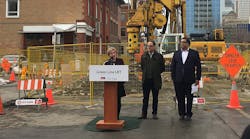Calgary City Council approves Green Line with updated Stage 1 alignment
The city council of Calgary, AB, Canada, is moving the planned 46-km (28.5-mile) Green Line light-rail project forward with the approval of the projects updated Stage 1 alignment and changes to construction staging on June 16.
The 20-km (12.4-mile) Stage 1 alignment will run from 16 Avenue N. to Shepard and includes nine stations. Project planners say Stage 1 provides the foundation for the larger Green Line project, which will be constructed in three stages as funding becomes available.
“Council’s approval today is a pivotal step in achieving the vision of Green Line promised to Calgarians,” said Michael Thompson, general manager of Green Line. “The Green Line will improve mobility for all Calgarians connecting communities, employment hubs and key destinations across the city.”
The C$4.9-billion ($US3.61-billion) Stage 1 will be constructed in three segments. Segment 1 will run between Elbow River to Shepard, Segment 2A will be between 2 Avenue SW station to Elbow River and Segment 2B will be between 16 Avenue N to north of 2 Avenue SW station. Segment 1’s opening date is anticipated in 2026.
“Stage 1 builds the core of the Green Line long-term vision and will enable future incremental expansion as funding is available to realize the full benefits of the rapid transit network,” Thompson said. “High quality transit, like LRT, is a necessity for cities to grow, be attractive to entrepreneurs and a talented workforce, and to be competitive economic centers locally and internationally. Green Line is planned for long-term city shaping and spurring redevelopment and investment opportunities in Calgary and will be an important part of the city’s recovery generating 20,000 jobs.”
The city council also approved Segment 1’s new construction staging strategy, which calls for a Request for Proposals to be released no later than July 24, 2020 for Segment 1. The “shovel ready” portion of the project is to be delivered as a design-build-finance project. However, the city notes the detailed design and construction of Segment 1 will begin in 2021.
Following the project’s approval, Alberta Minister of Transportation Ric McIver issued a letter to Calgary Mayor Neheed Nenshi that may put the issuance of an RFP into question. The letter states the province would review the project before obligations are incurred by the province. Last year, the province and the city signed a funding agreement where the federal government committed C$1.53 billion (US$1.13 billion) and the province of Alberta committed C$1.7 billion (US$1.25billion) to Stage 1.
“Let me begin by acknowledging that I am in favor of developing Calgary’s mass transit system in a comprehensive, affordable and economical manner and I have been a proponent of LRT construction since I first ran for Calgary City Council in 1998,” wrote Minister McIver.
He explained the provincial government remains in favor of the Green Line project’s goals, but as the largest public infrastructure project in the province’s history, it warrants analysis. Minister McIver also noted the project’s changes in scope, including the recent change to the Stage 1 alignment.
“We therefore intend to take the time necessary to complete a thorough and informed analysis of the benefits and risks of this latest version of the project before obligations are incurred by the province, to ensure that taxpayers are protected,” wrote Minister McIver.
Minister McIver noted the analysis would be completed this summer.

Mischa Wanek-Libman | Group Editorial Director
Mischa Wanek-Libman is director of communications with Transdev North America. She has more than 20 years of experience working in the transportation industry covering construction projects, engineering challenges, transit and rail operations and best practices.
Wanek-Libman has held top editorial positions at freight rail and public transportation business-to-business publications including as editor-in-chief and editorial director of Mass Transit from 2018-2024. She has been recognized for editorial excellence through her individual work, as well as for collaborative content.
She is an active member of the American Public Transportation Association's Marketing and Communications Committee and served 14 years as a Board Observer on the National Railroad Construction and Maintenance Association (NRC) Board of Directors.
She is a graduate of Drake University in Des Moines, Iowa, where she earned a Bachelor of Arts degree in Journalism and Mass Communication.




